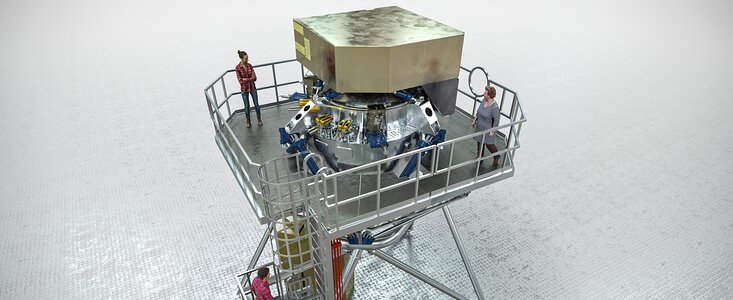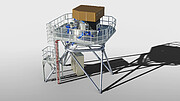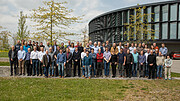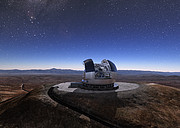Mitteilung
METIS-Instrument des ELT besteht Design-Etappenziel
5. Juni 2020
METIS, der leistungsstarke Imager und Spektrograf für das Extremely Large Telescope (ELT) der ESO, hat im Hauptsitz der ESO in Garching seine vorläufige Designprüfung bestanden. METIS, kurz für „Mid-infrared ELT Imager and Spectrograph“, wird den riesigen Hauptspiegel des Teleskops voll nutzen, um eine große Bandbreite wissenschaftlicher Themen zu untersuchen – von Objekten in unserem Sonnensystem bis zu fernen aktiven Galaxien. METIS wird extrem gut geeignet sein, um den Lebenszyklus von Sternen zu erforschen, von jungen Sternen und planetenbildenden Scheiben bis zu älteren Sternen gegen Ende ihrer Lebenszeit.
Das ELT wird das größte optische, bis zum mittleren Infrarotbereich nutzbare Teleskop der Welt sein, wenn es gegen Mitte dieses Jahrzehnts in Betrieb geht. Mit seinem 39 Meter großen Hauptspiegel und den fortschrittlichen Systemen für adaptive Optik wird es die sechsfache Auflösung des James-Webb-Weltraumteleskops haben. METIS wird dieses bemerkenswerte Teleskop und seine adaptive Optik voll ausnutzen, um Strukturen und Zusammensetzung von Objekten mit revolutionärer Präzision zu untersuchen.
Unter anderem wird von METIS erwartet, dass es große Beiträge zu einem der dynamischsten und aufregendsten Bereiche der Astronomie sowohl für Wissenschaftler als auch für die Öffentlichkeit, den Exoplaneten, leisten wird. Das Instrument wird in der Lage sein, Temperatur, Wetter und jahreszeitliche Veränderungen in der Atmosphäre vieler riesiger Exoplaneten zu untersuchen. Außerdem hat METIS das Potenzial, direkt terrestrische Exoplaneten bei den nächsten Sternen zu entdecken und, in günstigen Fällen, die Zusammensetzung ihrer Atmosphäre zu erforschen.
Jetzt, da das Instrument seine vorläufige Designprüfung bestanden hat, wird das METIS Konsortium das Design im Detail weiterentwickeln, bevor der Bau des Instruments beginnt.
Weitere Informationen
Das METIS-Konsortium besteht aus NOVA (niederländische Forschungsschule für Astronomie, vertreten durch die Universität Leiden, Niederlande), dem Max-Planck-Institut für Astronomie (MPIA, mit Sitz in Heidelberg), der Universität zu Köln, dem UK Astronomy Technology Centre (UKATC, Edinburgh, Großbritannien), der KU Leuven (Belgien), dem Kernforschungszentrum Saclay (CEA Saclay, Frankreich), dem Center for Astrophysics and Gravitation (CENTRA, Universität Lissabon, Portugal), der ETH Zürich (Schweiz), A* (einer österreichischen Partnerschaft, die durch die Universitäten Wien, Innsbruck, Graz und Linz sowie durch RICAM Linz, Österreichische Akademie der Wissenschaften, vertreten ist), der Universität Michigan in Ann Arbor (USA), dem Academia Sinica Institute of Astronomy and Astrophysics in Taipei (Taiwan) und der Universität Liège (Belgien) mit Beiträgen der ESO.
Links
- ESO-Webseite für METIS
- Webseite des METIS-Konsortiums (Leiden/NOVA)
- Das Extremely Large Telescope der ESO
Kontaktinformationen
Christoph Haupt
METIS Project Manager at ESO
Cell: +49 151 14176113
Email: Christoph.Haupt@eso.org
Ralf Siebenmorgen
METIS Project Scientist at ESO
Cell: +49 1575 088 6576
Email: Ralf.Siebenmorgen@eso.org
Bernhard R. Brandl
METIS Principal Investigator
Sterrewacht Leiden, Leiden University
Cell: +31 6211 85430
Email: brandl@strw.leidenuniv.nl
Bárbara Ferreira
ESO Public Information Officer
Garching bei München, Germany
Tel: +49 89 3200 6670
Cell: +49 151 241 664 00
Email: pio@eso.org
Über die Mitteilung
| ID: | ann20016 |
Our use of Cookies
We use cookies that are essential for accessing our websites and using our services. We also use cookies to analyse, measure and improve our websites’ performance, to enable content sharing via social media and to display media content hosted on third-party platforms.
ESO Cookies Policy
The European Organisation for Astronomical Research in the Southern Hemisphere (ESO) is the pre-eminent intergovernmental science and technology organisation in astronomy. It carries out an ambitious programme focused on the design, construction and operation of powerful ground-based observing facilities for astronomy.
This Cookies Policy is intended to provide clarity by outlining the cookies used on the ESO public websites, their functions, the options you have for controlling them, and the ways you can contact us for additional details.
What are cookies?
Cookies are small pieces of data stored on your device by websites you visit. They serve various purposes, such as remembering login credentials and preferences and enhance your browsing experience.
Categories of cookies we use
Essential cookies (always active): These cookies are strictly necessary for the proper functioning of our website. Without these cookies, the website cannot operate correctly, and certain services, such as logging in or accessing secure areas, may not be available; because they are essential for the website’s operation, they cannot be disabled.
Functional Cookies: These cookies enhance your browsing experience by enabling additional features and personalization, such as remembering your preferences and settings. While not strictly necessary for the website to function, they improve usability and convenience; these cookies are only placed if you provide your consent.
Analytics cookies: These cookies collect information about how visitors interact with our website, such as which pages are visited most often and how users navigate the site. This data helps us improve website performance, optimize content, and enhance the user experience; these cookies are only placed if you provide your consent. We use the following analytics cookies.
Matomo Cookies:
This website uses Matomo (formerly Piwik), an open source software which enables the statistical analysis of website visits. Matomo uses cookies (text files) which are saved on your computer and which allow us to analyze how you use our website. The website user information generated by the cookies will only be saved on the servers of our IT Department. We use this information to analyze www.eso.org visits and to prepare reports on website activities. These data will not be disclosed to third parties.
On behalf of ESO, Matomo will use this information for the purpose of evaluating your use of the website, compiling reports on website activity and providing other services relating to website activity and internet usage.
Matomo cookies settings:
Additional Third-party cookies on ESO websites: some of our pages display content from external providers, e.g. YouTube.
Such third-party services are outside of ESO control and may, at any time, change their terms of service, use of cookies, etc.
YouTube: Some videos on the ESO website are embedded from ESO’s official YouTube channel. We have enabled YouTube’s privacy-enhanced mode, meaning that no cookies are set unless the user actively clicks on the video to play it. Additionally, in this mode, YouTube does not store any personally identifiable cookie data for embedded video playbacks. For more details, please refer to YouTube’s embedding videos information page.
Cookies can also be classified based on the following elements.
Regarding the domain, there are:
- First-party cookies, set by the website you are currently visiting. They are stored by the same domain that you are browsing and are used to enhance your experience on that site;
- Third-party cookies, set by a domain other than the one you are currently visiting.
As for their duration, cookies can be:
- Browser-session cookies, which are deleted when the user closes the browser;
- Stored cookies, which stay on the user's device for a predetermined period of time.
How to manage cookies
Cookie settings: You can modify your cookie choices for the ESO webpages at any time by clicking on the link Cookie settings at the bottom of any page.
In your browser: If you wish to delete cookies or instruct your browser to delete or block cookies by default, please visit the help pages of your browser:
Please be aware that if you delete or decline cookies, certain functionalities of our website may be not be available and your browsing experience may be affected.
You can set most browsers to prevent any cookies being placed on your device, but you may then have to manually adjust some preferences every time you visit a site/page. And some services and functionalities may not work properly at all (e.g. profile logging-in, shop check out).
Updates to the ESO Cookies Policy
The ESO Cookies Policy may be subject to future updates, which will be made available on this page.
Additional information
For any queries related to cookies, please contact: pdprATesoDOTorg.
As ESO public webpages are managed by our Department of Communication, your questions will be dealt with the support of the said Department.




